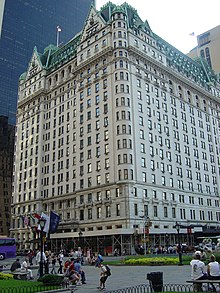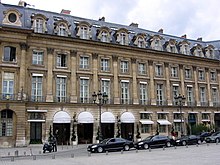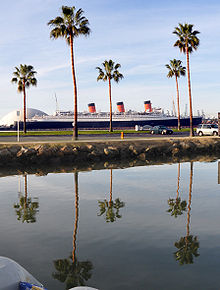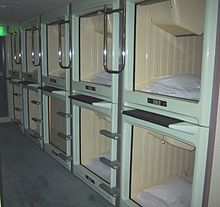Hotel: Difference between revisions
Tomgenders (talk | contribs) No edit summary |
|||
| Line 43: | Line 43: | ||
[[File:Hotel Astoria.jpg|thumb|left|[[Hotel Astoria (Saint Petersburg)|Hotel Astoria]] and a statue of Tsar [[Nicholas I of Russia]] in front, in [[Saint Petersburg]], [[Russia]]]] |
[[File:Hotel Astoria.jpg|thumb|left|[[Hotel Astoria (Saint Petersburg)|Hotel Astoria]] and a statue of Tsar [[Nicholas I of Russia]] in front, in [[Saint Petersburg]], [[Russia]]]] |
||
[[Boutique hotel]]s are typically hotels with a unique environment or intimate setting. |
[[Boutique hotel]]s are typically hotels with a unique environment or intimate setting. |
||
Some hotels have gained their renown through tradition, by hosting significant events or persons, such as Schloss [[Cecilienhof]] in [[Potsdam]], [[Germany]], which derives its fame from the [[Potsdam Conference]] of the [[World War II]] allies [[Winston Churchill]], [[Harry Truman]] and [[Joseph Stalin]] in 1945. The [[Taj Mahal Palace & Tower]] in [[Mumbai]] is one of India's most famous and historic hotels because of its association with the [[Indian independence movement]]. Some establishments have given name to a particular meal or beverage, as is the case with the [[Waldorf-Astoria Hotel|Waldorf Astoria]] in [[New York City]], United States where the [[Waldorf Salad]] was first created or the [[Hotel Sacher]] in [[Vienna]], Austria, home of the [[Sachertorte]]. Others have achieved fame by association with dishes or cocktails created on their premises, such as the [[Hotel de Paris]] where the [[crêpe Suzette]] was invented or the [[Raffles Hotel]] in [[Singapore]], where the [[Singapore Sling]] cocktail was devised. |
Some hotels have gained their renown through tradition, by hosting significant events or persons, such as Schloss [[Cecilienhof]] in [[Potsdam]], [[Germany]], which derives its fame from the [[Potsdam Conference]] of the [[World War II]] allies [[Winston Churchill]], [[Harry Truman]] and [[Joseph Stalin]] in 1945.{{citation needed}} The [[Taj Mahal Palace & Tower]] in [[Mumbai]] is one of India's most famous and historic hotels because of its association with the [[Indian independence movement]]. Some establishments have given name to a particular meal or beverage, as is the case with the [[Waldorf-Astoria Hotel|Waldorf Astoria]] in [[New York City]], United States where the [[Waldorf Salad]] was first created or the [[Hotel Sacher]] in [[Vienna]], Austria, home of the [[Sachertorte]]. Others have achieved fame by association with dishes or cocktails created on their premises, such as the [[Hotel de Paris]] where the [[crêpe Suzette]] was invented or the [[Raffles Hotel]] in [[Singapore]], where the [[Singapore Sling]] cocktail was devised.{{citation needed}} |
||
[[File:Hotel Ritz Paris.jpg|thumb|right|[[Hôtel Ritz Paris|Hôtel Ritz]] in [[Paris]], [[France]]]] |
[[File:Hotel Ritz Paris.jpg|thumb|right|[[Hôtel Ritz Paris|Hôtel Ritz]] in [[Paris]], [[France]]]] |
||
| Line 49: | Line 49: | ||
A number of hotels have entered the public consciousness through popular culture, such as the [[Ritz Hotel]] in [[London]], through its association with [[Irving Berlin|Irving Berlin's]] song, '[[Puttin' on the Ritz]]'. The [[Algonquin Hotel]] in New York City is famed as the meeting place of the literary group, the [[Algonquin Round Table]], and [[Hotel Chelsea]], also in New York City, has been the subject of a number of songs and the scene of the stabbing of [[Nancy Spungen]] (allegedly by her boyfriend [[Sid Vicious]]). |
A number of hotels have entered the public consciousness through popular culture, such as the [[Ritz Hotel]] in [[London]], through its association with [[Irving Berlin|Irving Berlin's]] song, '[[Puttin' on the Ritz]]'. The [[Algonquin Hotel]] in New York City is famed as the meeting place of the literary group, the [[Algonquin Round Table]], and [[Hotel Chelsea]], also in New York City, has been the subject of a number of songs and the scene of the stabbing of [[Nancy Spungen]] (allegedly by her boyfriend [[Sid Vicious]]). |
||
===Resort hotels=== |
===Resort hotels=== |
||
[[File:Wynn 2 (2).jpg|thumb|right|[[Wynn Las Vegas]], [[Las Vegas Valley|Las Vegas]], [[Nevada]]]] |
[[File:Wynn 2 (2).jpg|thumb|right|[[Wynn Las Vegas]], [[Las Vegas Valley|Las Vegas]], [[Nevada]]]] |
||
Revision as of 07:47, 18 June 2013





A hotel is an establishment that provides lodging paid on a short-term basis. The provision of basic accommodation, in times past, consisting only of a room with a bed, a cupboard, a small table and a washstand has largely been replaced by rooms with modern facilities, including en-suite bathrooms and air conditioning or climate control. Additional common features found in hotel rooms are a telephone, an alarm clock, a television, a safe, a mini-bar with snack foods and drinks, and facilities for making tea and coffee. Luxury features include bathrobes and slippers, a pillow menu, twin-sink vanities, and jacuzzi bathtubs. Larger hotels may provide additional guest facilities such as a swimming pool, fitness center, business center, childcare, conference facilities and social function services.
Hotel rooms are usually numbered (or named in some smaller hotels and B&Bs) to allow guests to identify their room. Some hotels offer meals as part of a room and board arrangement. In the United Kingdom, a hotel is required by law to serve food and drinks to all guests within certain stated hours. In Japan, capsule hotels provide a minimized amount of room space and shared facilities.
Etymology
The word hotel is derived from the French hôtel (coming from hôte meaning host), which referred to a French version of a townhouse or any other building seeing frequent visitors, rather than a place offering accommodation. In contemporary French usage, hôtel now has the same meaning as the English term, and hôtel particulier is used for the old meaning. The French spelling, with the circumflex, was also used in English, but is now rare. The circumflex replaces the 's' found in the earlier hostel spelling, which over time took on a new, but closely related meaning. Grammatically, hotels usually take the definite article – hence "The Astoria Hotel" or simply "The Astoria."
Types
Hotel operations vary in size, function, and cost. Most hotels and major hospitality companies that operate hotels have set widely accepted industry standards to classify hotel types. General categories include the following;
- Conference and resort hotels often contain full-sized luxury facilities with full service accommodations and amenities.
- Examples may include: Conrad Hotels, InterContinental Hotels, Ritz-Carlton, Four Seasons Hotels and Resorts, Dorchester Collection, JW Marriott Hotels, Starwood – Westin Hotels, Hilton, Marriott, and Hyatt
- Historic Inns and boutique hotels often contain luxury facilities of varying size in unique or intimate settings with full service accommodations.
- Select Service
- Examples may include: Holiday Inn, Courtyard by Marriott and Hilton Garden Inn
- Limited Service
- Examples may include: Hampton Inn, aloft, Holiday Inn Express, Fairfield Inn, Four Points by Sheraton, and Days Inn
- Extended Stay
- Examples may include: Staybridge Suites, Homewood Suites by Hilton, Residence Inn by Marriott, element, and Extended Stay Hotels
- Timeshare
- Examples may include: Hilton Grand Vacations, Marriott Vacation Club International, Westgate Resorts, Starwood Vacation Ownership, and Disney Vacation Club
- Destination Club
- Botels – floating hotels.
Management
Hotel management is a globally accepted career field and academic field of study. Degree programs such as hospitality management studies, a business degree, and/or certification programs formally prepare hotel managers for industry practice.
Most hotel establishments consist of a General Manager who serves as the head executive (often referred to as the "Hotel Manager"), department heads who oversee various departments within a hotel, middle managers, administrative staff, and line-level supervisors. The organizational chart and quantity of job positions varies by hotel size, function, and is often determined by hotel ownership.
Speciality hotels
Historic Inns and boutique hotels

Boutique hotels are typically hotels with a unique environment or intimate setting. Some hotels have gained their renown through tradition, by hosting significant events or persons, such as Schloss Cecilienhof in Potsdam, Germany, which derives its fame from the Potsdam Conference of the World War II allies Winston Churchill, Harry Truman and Joseph Stalin in 1945.[citation needed] The Taj Mahal Palace & Tower in Mumbai is one of India's most famous and historic hotels because of its association with the Indian independence movement. Some establishments have given name to a particular meal or beverage, as is the case with the Waldorf Astoria in New York City, United States where the Waldorf Salad was first created or the Hotel Sacher in Vienna, Austria, home of the Sachertorte. Others have achieved fame by association with dishes or cocktails created on their premises, such as the Hotel de Paris where the crêpe Suzette was invented or the Raffles Hotel in Singapore, where the Singapore Sling cocktail was devised.[citation needed]


A number of hotels have entered the public consciousness through popular culture, such as the Ritz Hotel in London, through its association with Irving Berlin's song, 'Puttin' on the Ritz'. The Algonquin Hotel in New York City is famed as the meeting place of the literary group, the Algonquin Round Table, and Hotel Chelsea, also in New York City, has been the subject of a number of songs and the scene of the stabbing of Nancy Spungen (allegedly by her boyfriend Sid Vicious).
Resort hotels

Some hotels are built specifically to create a captive trade, example at casinos and holiday resorts. Though of course hotels have always been built in popular destinations, the defining characteristic of a resort hotel is that it exists purely to serve another attraction, the two having the same owners.
On the Las Vegas Strip there is a tradition of one-upmanship with luxurious and extravagant hotels in a concentrated area. This trend now has extended to other resorts worldwide, but the concentration in Las Vegas is still the world's highest: nineteen of the world's twenty-five largest hotels by room count are on the Strip, with a total of over 67,000 rooms.[1]
In Europe Center Parcs might be considered a chain of resort hotels, since the sites are largely man-made (though set in natural surroundings such as country parks) with captive trade, whereas holiday camps such as Butlins and Pontin's are probably not considered as resort hotels, since they are set at traditional holiday destinations which existed before the camps.
Other speciality hotels

- The Burj al-Arab hotel in Dubai, United Arab Emirates, built on an artificial island, is structured in the shape of a boat's sail.
- The Library Hotel in New York City, is unique in that each of its ten floors is assigned one category from the Dewey Decimal System.
- The Jailhotel Löwengraben in Lucerne, Switzerland is a converted prison now used as a hotel.
- The Luxor, a hotel and casino on the Las Vegas Strip in Paradise, Nevada, United States is unusual due to its pyramidal structure.
- The Liberty Hotel in Boston, used to be the Charles Street Jail.
- Built in Scotland and completed in 1936, The former ocean liner RMS Queen Mary in Long Beach, California, United States uses its first-class staterooms as a hotel, after retiring in 1967 from Transatlantic service.
- Throughout the world there are several hotels built from converted airliners.
Unique hotels
Treehouse hotels
Some hotels are built with living trees as structural elements, for example the Treehotel near Piteå, Sweden, the Costa Rica Tree House in the Gandoca-Manzanillo Wildlife Refuge, Costa Rica; the Treetops Hotel in Aberdare National Park, Kenya; the Ariau Towers near Manaus, Brazil, on the Rio Negro in the Amazon; and Bayram's Tree Houses in Olympos, Turkey.
Straw bale hotels
The Maya Guesthouse in Nax Mont-Noble in the Swiss Alps, is the first hotel in Europe built entirely with straw bales. Due to the insulation values of the walls it needs no conventional heating or air conditioning system, although the Maya Guesthouse is built at an altitude of 1,300 meters in the Alps.[2]
Bunker hotels
The Null Stern Hotel in Teufen, Appenzellerland, Switzerland and the Concrete Mushrooms in Albania[3] are former nuclear bunkers transformed into hotels.
Cave hotels
The Cuevas Pedro Antonio de Alarcón (named after the author) in Guadix, Spain, as well as several hotels in Cappadocia, Turkey, are notable for being built into natural cave formations, some with rooms underground. The Desert Cave Hotel in Coober Pedy, South Australia is built into the remains of an opal mine.
Cliff hotels

Located on the coast but high above sea level, these hotels offer unobstructed panoramic views and a great sense of privacy without the feeling of total isolation. Some examples from around the globe are the Riosol Hotel in Gran Canaria, Caruso Belvedere Hotel in Amalfi Coast (Italy), Aman Resorts Amankila in Bali, Birkenhead House in Hermanus (South Africa), The Caves in Jamaica and Caesar Augustus in Capri.[4]
Capsule hotels

Capsule hotels are a type of economical hotel that are found in Japan, where people sleep in stacks of rectangular containers.
Ice, snow and igloo hotels
Igloo Village in Kakslauttanen,the Ice Hotel in Jukkasjärvi, Sweden, and the Hotel de Glace in Duschenay, Canada, melt every spring and are rebuilt each winter; the Mammut Snow Hotel in Finland is located within the walls of the Kemi snow castle; and the Lainio Snow Hotel is part of a snow village near Ylläs, Finland.
Garden hotels
Garden hotels, famous for their gardens before they became hotels, include Gravetye Manor, the home of garden designer William Robinson, and Cliveden, designed by Charles Barry with a rose garden by Geoffrey Jellicoe.
Underwater hotels
Some hotels have accommodation underwater, such as Utter Inn in Lake Mälaren, Sweden. Hydropolis, project cancelled 2004 in Dubai, would have had suites on the bottom of the Persian Gulf, and Jules' Undersea Lodge in Key Largo, Florida requires scuba diving to access its rooms.
Railway hotels
Frequently, expanding railway companies built grand hotels at their termini, such as the Midland Hotel, Manchester next to the former Manchester Central Station, and in London the ones above St Pancras railway station and Charing Cross railway station. London also has the Chiltern Court Hotel above Baker Street tube station; there are also Canada's grand railway hotels. They are or were mostly, but not exclusively, used by those travelling by rail.
Motels
A motel (motor hotel) is a hotel which is for a short stay, usually for a night, for motorists on long journeys. It has direct access from the room to the vehicle (for example a central parking lot around which the buildings are set), and is built conveniently close to major roads and intersections.
World record setting hotels

Largest
In 2006, Guinness World Records listed the First World Hotel in Genting Highlands, Malaysia, as the world's largest hotel with a total of 6,118 rooms.[5] The Izmailovo Hotel in Moscow has the most rooms, with 7,500, followed by the Venetian Palazzo Complex in Las Vegas (7,117 rooms) and MGM Grand Las Vegas (6,852 rooms).
Oldest
According to the Guinness Book of World Records, the oldest hotel in operation is the Nisiyama Onsen Keiunkan in Yamanashi, Japan. The hotel, first opened in 707 A.D. has been operated by the same family for forty-six generations. The title was held until 2011 by the Hoshi Ryokan, in the Awazu Onsen area of Komatsu, Japan, which opened in the year 718, as the history of the Nisiyama Onsen Keiunkan was virtually unknown.[6]
Highest
The Ritz-Carlton Hong Kong claims to be the world's highest hotel.[7] It is located in the top floors of the International Commerce Centre in Hong Kong, at 484-metre (1,588 ft) above ground level.
Hotel rooms as an investment
Some hotels sell individual rooms to investors. Timeshare is an example of this kind of investment. The buyer is allowed to stay in the room without charge or at a reduced rate for a given number of days each year. The investor is paid a share of the takings for the room. Rooms can be sold on a leasehold basis, sometimes on a 999-year lease. Room owners are free to sell at any time.[8]
Living in hotels
A number of public figures have notably chosen to take up semi-permanent or permanent residence in hotels.
- Fashion designer Coco Chanel lived in the Hotel Ritz Paris on and off for more than 30 years.
- Inventor Nikola Tesla lived the last ten years of his life at the New Yorker Hotel until he died in his room in 1943.
- Larry Fine (of the Three Stooges) and his family lived in hotels, due to his extravagant spending habits and his wife's dislike for housekeeping. They first lived in the President Hotel in Atlantic City, New Jersey, where his daughter Phyllis was raised, then the Knickerbocker Hotel in Hollywood. Not until the late 1940s did Larry buy a home in the Los Feliz area of Los Angeles.
- General Douglas McArthur lived his last 14 years in the penthouse of the Waldorf Towers, a part of the Waldorf-Astoria Hotel. The composer Cole Porter also spent the last 25 years of his life in an apartment at the Waldorf Towers.
- Millionaire Howard Hughes lived in hotels during the last ten years of his life (1966–76), primarily in Las Vegas, as well as Acapulco, Beverly Hills, Boston, Freeport, London, Managua, Nassau, Vancouver, and others.
- Vladimir Nabokov and his wife Vera lived in the Montreux Palace Hotel in Montreux, Switzerland (1961-his death in 1977).
- Actor Richard Harris lived at the Savoy Hotel while in London. Hotel archivist Susan Scott recounts an anecdote that, when he was being taken out of the building on a stretcher shortly before his death in 2002, he raised his hand and told the diners "it was the food."[9]
- Egyptian actor Ahmed Zaki lived his last 15 years in Ramses Hilton Hotel – Cairo.
- British entrepreneur Jack Lyons lived in the Hotel Mirador Kempinski in Switzerland for several years until his death in 2008.
- American actress Elaine Stritch lived in the Savoy Hotel in London for over a decade.[10]
See also
Industry and careers
Human habitation types
References
- ^ "The 25 Largest Hotels in the World". Retrieved 18 April 2009.
- ^ "About the first straw bale hotel in europe". Pr-inside.com. 1 August 2011. Retrieved 29 May 2012.
- ^ [1][dead link]
- ^ http://edition.cnn.com/2012/11/13/travel/cllifftop-hotels
- ^ Genting's First World Recognized As World's Largest Hotel, Bernama.com
- ^ Hoshi Ryokan website, accessed 22 June 2008. Ho-shi.co.jp. Retrieved on 2011-06-12.
- ^ "The Ritz-Carlton Hong Kong: The world's highest hotel opens". cnngo.com. 29March 2011.
{{cite web}}: Check date values in:|date=(help) - ^ Sam Dunn; Judith Heywood (7 September 2007). "Overnight profit". The Times. Retrieved 4 November 2009.
- ^ ''Home Suite Home''. BBC News (2007-09-12). Retrieved on 2011-06-12.
- ^ "Elaine Stritch". Tcm.com. Retrieved 29 May 2012.
Further reading
- Lundberg, Donald E., The Hotel and Restaurant Business, Boston: Cahners Books, 1974. ISBN 0-8436-2044-7
